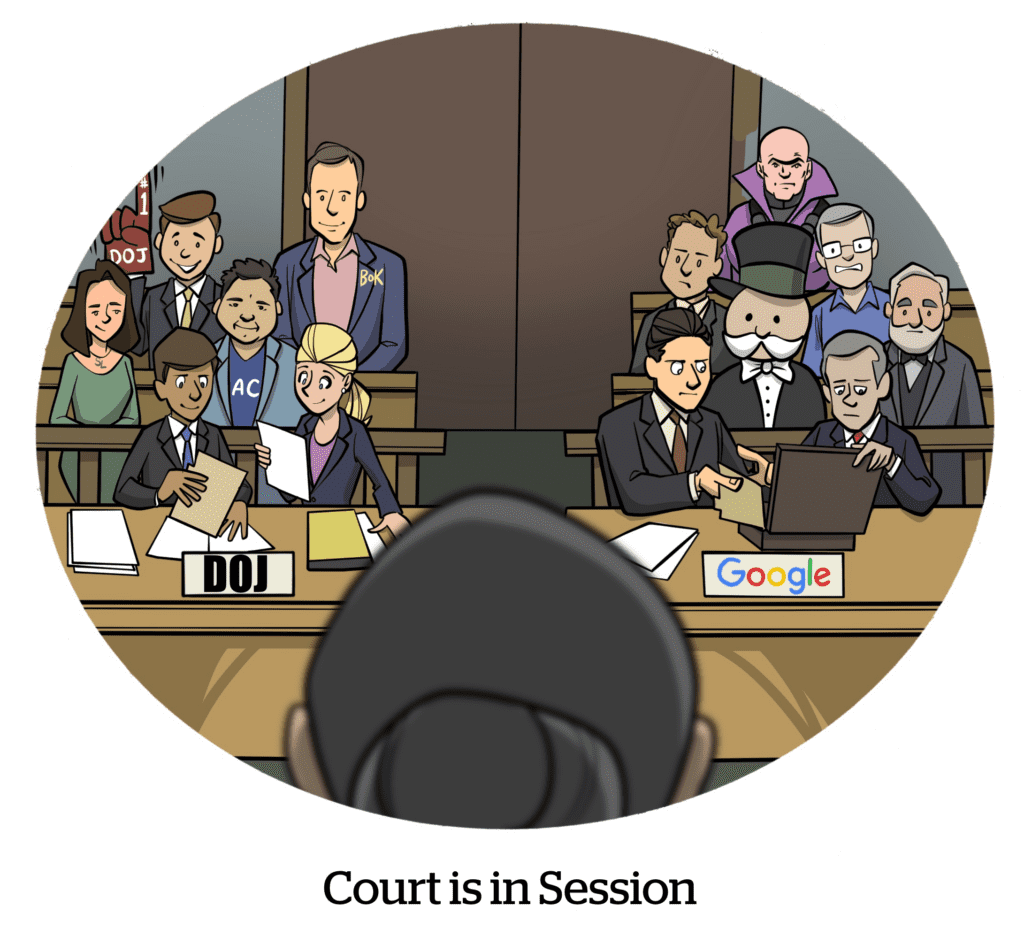Google Search Monopoly: Another Round In The Legal Showdown With DOJ

Table of Contents
The DOJ's Allegations: Stifling Competition and Innovation
The DOJ's case hinges on allegations that Google has engaged in a range of anti-competitive practices to maintain its dominant position in the search engine market. These actions, the DOJ argues, have stifled competition and stifled innovation, ultimately harming consumers.
Anti-Competitive Practices
The DOJ points to several specific practices as evidence of Google's anti-competitive behavior:
- Exclusive Contracts: Google allegedly entered into exclusive contracts with mobile device manufacturers, pre-installing Google Search and Chrome as default applications. This effectively locks out competitors from gaining a foothold on these devices.
- Pre-Installation of Google Search and Chrome: This pre-installation strategy makes it difficult for alternative search engines and browsers to compete for users' attention and usage. Consumers often don't realize they can change their default search engine, giving Google a significant advantage.
- Search Bias (Preferential Treatment): The DOJ alleges that Google prioritizes its own services in search results, pushing them to the top even if competitors offer better or more relevant results. This preferential treatment gives Google an unfair advantage in various online markets, from travel and shopping to local services.
These practices, the DOJ argues, severely limit the ability of competitors to gain market share and innovate, resulting in less choice and less dynamism in the online search market.
Market Dominance and its Consequences
Google's dominance in the search engine market is undeniable. Globally, Google Search holds an overwhelming majority of market share, often exceeding 90% in many regions. This extreme market concentration has several dire consequences:
- Limited Choice: Consumers have very limited alternatives to Google Search, reducing their options and ability to compare different search experiences.
- Reduced Innovation: With less competitive pressure, Google may have less incentive to innovate and improve its products and services.
- Potentially Higher Prices: Although Google Search itself is free, the dominance in search advertising translates to higher prices for advertisers, which can eventually be passed on to consumers.
The Impact on Ad Revenue
Google's alleged monopolistic practices significantly impact the online advertising market. Its dominance in search allows Google to command exorbitant fees from advertisers, potentially squeezing out smaller publishers and advertisers who cannot compete with Google's scale and market power. This creates an imbalance in the digital advertising ecosystem, potentially affecting the financial viability of smaller businesses and websites.
Google's Defense Strategies: Countering the DOJ's Claims
Google vigorously defends itself against the DOJ's allegations, arguing that its market position is a result of merit, superior products, and consumer preference.
Arguments for Competitive Merit
Google highlights its substantial investments in research and development (R&D), emphasizing continuous improvements in search technology, user experience, and algorithm optimization as the reasons behind its market leadership. They emphasize innovations such as AI-powered search features and advancements in search algorithms as proof of their commitment to providing superior service.
The Importance of Free Services
Google strongly argues that its core services, including Google Search and Gmail, are free and accessible to all users, directly benefiting consumers worldwide. They contend that providing free services fosters innovation and empowers users, contradicting claims that their actions are detrimental to competition.
Counterarguments to Anti-Competitive Practices
Google counters specific allegations by emphasizing the benefits of its practices and refuting claims of deliberate anti-competitive behavior. They often argue that the integration of their services creates a seamless user experience and provides added value, not unfair advantages over competitors. They also challenge the causality between their market share and any alleged suppression of competition.
Potential Outcomes and Implications of the Legal Showdown
The outcome of this legal battle could significantly impact the tech landscape and consumers globally.
Possible Judgments and Penalties
Several potential outcomes are possible, including:
- Significant Fines: Google could face substantial financial penalties for violating antitrust laws.
- Structural Changes: The court might order Google to restructure its business to increase competition, potentially by divesting certain assets.
- Behavioral Remedies: The court could impose specific rules on Google's conduct, prohibiting certain practices deemed anti-competitive.
Impact on the Tech Industry
This case sets a crucial precedent for future antitrust cases in the tech industry. A strong ruling against Google could embolden regulators to scrutinize other powerful tech companies, potentially leading to increased regulation and a reshaping of the industry's competitive dynamics.
Effects on Consumers
Depending on the outcome, consumers could experience several changes, including:
- More Diverse Search Results: Increased competition might lead to more diverse and varied search results.
- Innovation in Search Technology: More competition could spur innovation in search algorithms and features.
- Changes in Online Advertising: The outcome could significantly alter the dynamics of the online advertising market.
Conclusion: The Future of the Google Search Monopoly and the Call for Accountability
The legal battle surrounding the alleged "Google Search Monopoly" highlights the crucial tension between innovation and market dominance. The DOJ's claims of anti-competitive practices are countered by Google's assertions of meritocratic success. The ramifications of this case extend far beyond Google, impacting the future of competition and innovation within the entire tech sector. This legal battle underscores the importance of ongoing scrutiny of dominant players in the digital economy to protect both consumers and the competitive landscape. To remain informed about this evolving situation and its implications, continue following "Google search monopoly lawsuit updates," or delve deeper into "Google antitrust case analysis." The future of the internet, and our access to information, hinges on the outcome of this critical case.

Featured Posts
-
 The End Of Ryujinx Nintendo Intervention And Emulator Shutdown
Apr 22, 2025
The End Of Ryujinx Nintendo Intervention And Emulator Shutdown
Apr 22, 2025 -
 Why Robots Struggle To Replicate Human Skill In Nike Sneaker Production
Apr 22, 2025
Why Robots Struggle To Replicate Human Skill In Nike Sneaker Production
Apr 22, 2025 -
 The China Factor Examining Luxury Automakers Struggles
Apr 22, 2025
The China Factor Examining Luxury Automakers Struggles
Apr 22, 2025 -
 Future Of Microsoft Activision Merger Uncertain After Ftc Appeal
Apr 22, 2025
Future Of Microsoft Activision Merger Uncertain After Ftc Appeal
Apr 22, 2025 -
 Ai Digest Transforming Repetitive Documents Into Engaging Poop Podcasts
Apr 22, 2025
Ai Digest Transforming Repetitive Documents Into Engaging Poop Podcasts
Apr 22, 2025
